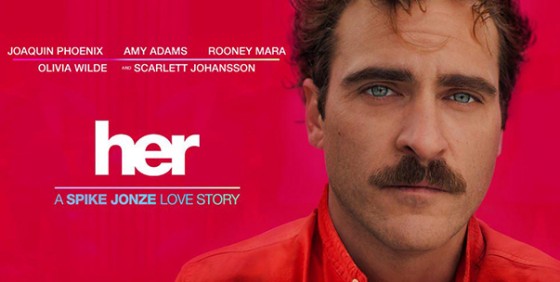 This film is really something special. Lately there’s been a good amount of art focused on the way technology is reshaping our lives (Dave Eggers’s new novel The Circle being a prime example — read it, it’s stupendous), but Her has done something unique with that subject matter. The film takes place in a lightly futurized Los Angeles, and Joaquin Phoenix plays Theodore, a man who falls in love with the operating system on his computer. But this is no ordinary operating system; her name is Samantha (Scarlett Johansson), and she has been programmed to grow and learn through her experiences — essentially, to have a real and evolving personality.
This film is really something special. Lately there’s been a good amount of art focused on the way technology is reshaping our lives (Dave Eggers’s new novel The Circle being a prime example — read it, it’s stupendous), but Her has done something unique with that subject matter. The film takes place in a lightly futurized Los Angeles, and Joaquin Phoenix plays Theodore, a man who falls in love with the operating system on his computer. But this is no ordinary operating system; her name is Samantha (Scarlett Johansson), and she has been programmed to grow and learn through her experiences — essentially, to have a real and evolving personality.
Theodore is a writer for BeautifulHandwrittenLetters.com, where he crafts professional “handwritten” love letters (which he dictates to his computer, and the computer then prints out in a loopy scrawl). He’s a melancholy man — “Play a melancholy song,” he mumbles to his smartphone as he walks home from work — and is still reeling from the recent collapse of his marriage, so it makes sense that he would download an operating system that could provide him with some sort of artificial companionship. Equally believable is his attraction (first platonic, then romantic) to Samantha, who is instantly likeable: upbeat, curious, spirited, and — let’s face it — kind of sexy. Characterized only by her speaking voice, her personality is distinct and appealing from the moment she appears in the film. Which is important. We understand Theodore’s love for Samantha; in a sense, we fall in love with Samantha ourselves.
Perhaps the film’s greatest accomplishment is this ability to make us care deeply for its characters. Phoenix renders Theodore particularly sympathetic — genuine, thoughtful, softspoken, sensitive. (“You are part man and part woman,” a coworker tells him seriously after reading one of his letters. “It’s a compliment.”) We like and care about Theodore, and by extension we care about his relationships: his romantic relationship with Samantha, his affectionate friendship with his college buddy Amy (Amy Adams). This allows the film to be very intimate; we share the characters’ emotions, we have a stake in their interactions.
In some ways, Theodore and Samantha’s relationship is just like any other romantic relationship: they argue, they have thoughtful conversations, they make each other laugh, they have sex (so to speak). But of course, they also inevitably run into challenges that are specific to their obvious differences. Samantha struggles with frustration over the limitations of not having a physical body. Theodore finds himself “coming out” to friends and coworkers, revealing that his girlfriend is an operating system and not a human being. Some don’t bat an eye, while others (namely his ex-wife, volatile and coldly beautiful, played by Rooney Mara) scorn Theodore for dating “his laptop” instead of having a real relationship. “Is it not a real relationship?” Theodore later asks Amy, his brow furrowed. What is a real relationship? What constitutes a real person?
And that’s the film’s second great accomplishment: its ability to resonate so gracefully on both an emotional and an intellectual level. This is an incredibly emotional and evocative story — it will make you cry, laugh, marvel, ache inside. And it’s also gently philosophical, considering existential questions, questions of love and relationships, questions of the role technology plays and should play in our lives. The concept of this film could have easily proven to be gimmicky, but writer/director Spike Jonze avoids that trap by engaging deeply with the feelings and ideas the premise raises. Her is complex, captivating, and — for all its involvement with technology — an exquisitely human film.
